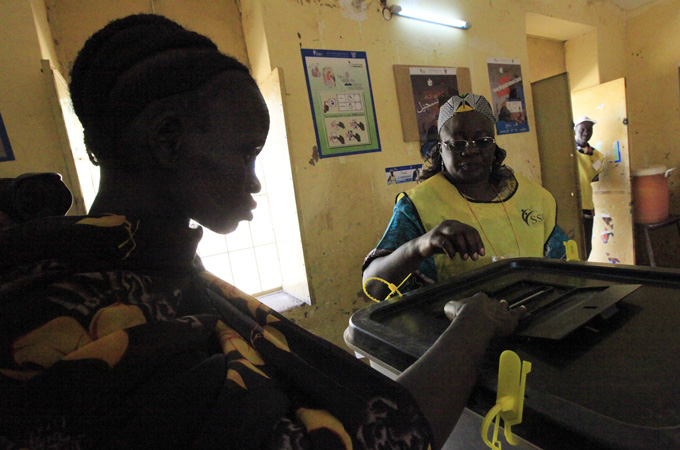Sudan poll clears another hurdle
High turnout reported as voting ends, but contentious issues remain once the ballots have been counted.

 |
| Turnout for the referendum is expected to be huge when official figures are announced [Reuters] |
With southern Sudan’s week-long referendum polling for secession coming to an end on Saturday after a massive turnout of voters, one of the biggest worry for its leaders and their backers is beyond them.
Although the official turnout has not yet been confirmed by the Southern Sudan Referendum Commission, the Sudan People’s Liberation Movement [SPLM], the ruling party in the south, has declared that the turnout threshold required for the vote to be valid has been surpassed.
Citing its own estimates, the SPLM said the 60 per cent mark was reached on the third day of voting.
While most southerner’s would see any majority as justification for secession, their leaders would want to strictly abide by rules to deprive the north of any grounds to refuse independence.
To achieve a high turnout, the leaders and civil society had organised massive publicity campaigns in the buildup to the vote. From church pulpits to music concerts to countdown clocks and hoardings to mass rallies, all possible platforms were used.
ANC assistance
Helping the southerners were groups like the African National Congress, the South African liberation movement that is now the ruling party.
“The ANC has been advising the SPLM on mobilising the people. We have immense home-grown experience in this area,” Carmen Smidt, the party’s international relations co-ordinator, who was in Juba as a poll observer, said.
The next threshold for the south in its quest for independence is the 50 per cent plus one number of votes the secession option has to get.
While many in the south would vouch that secession is the only option on card, worries about translating that to the ballot paper persist.
One worry is whether illiterate voters would correctly mark the “right” choice symbolised by an open palm against that of unity marked by clasped hands.
With education levels barely touching 20 per cent, it is feared that many of the citizenry would have difficulty in relating a simply drawn two-dimensional figure on the ballot with the choice they want to make.
“The uneducated mind cannot tell a two dimensional figure from a three dimensional one of the same item,” Kenyi Spencer, who investigated voter education during earlier Sudanese elections, said.
Writing in The Parliamentarian, a magazine published from Juba, the southern capital, Spencer said that this flaw could distort the vote.
Ink transfer
Another concern was whether the ink used for making the thumb impression on secession choice may also get transferred on to the opposite choice when the ballot is folded and thus invalidate the vote.
Chan Reec Madut, who heads the Juba-based Southern Sudan Referendum Bureau, said he was given the assurance that the ink would dry quickly.
“The voter can fold the ballot anyway he or she wants if still in doubt. There is no provision in the referendum act that guides or restricts how the paper has to be folded,” Madut said.
Apart from these concerns, poll observers in Juba were confident that the referendum process will conclude as planned.
“With [Sudanese President Omar] Bashir’s unequivocal support for the south regardless of the outcome of the vote and international hand-holding and pressure on both sides [north and south] to behave, the operational aspect is expected to be smooth,” Iqbal Jhazbhay, a professor at the University of South Africa, and part of his country’s poll observation team, said.
“The hardest part is yet to come.”
The torturous bit will come after the referendum votes are tabulated and the result announced in the first half of February.
Contentious issues
If, as expected, the south opts to secede, all the contentious issues like division of national debt, borders and the status of the Abyei region will have to be decided before the Comprehensive Peace Agreement [CPA], which made the referendum possible, expires on July 9.
Thabo Mbeki, the chairperson of the African Union High Level Implementation Panel for Sudan (AUHIP), was of the opinion that all the outstanding issues under the CPA are likely to be resolved before the deadline.
Answering students of Juba university and members of civil society on the eve of the vote, the former president of South Africa said his panel has been engaged at the highest possible levels.
He said as part of the CPA, the Doha peace process on Darfur will also be enlarged to include various other constituents besides the belligerents.
However, analysts fear that the north and the south would have very little time to agree upon the practical issues of how to separate. It remains to be seen if the process, as Mbeki put it, will be a “chance to reset relations, know one another better and reconcile”.